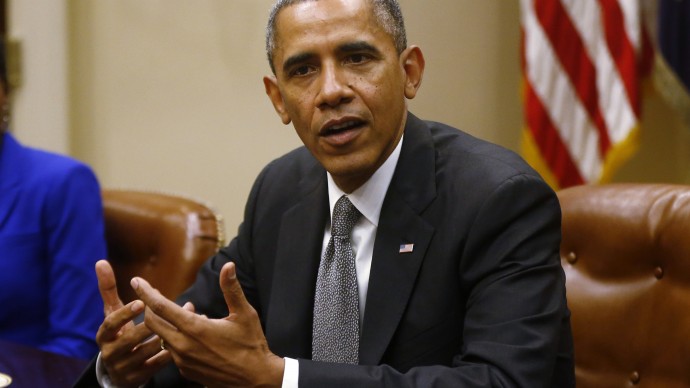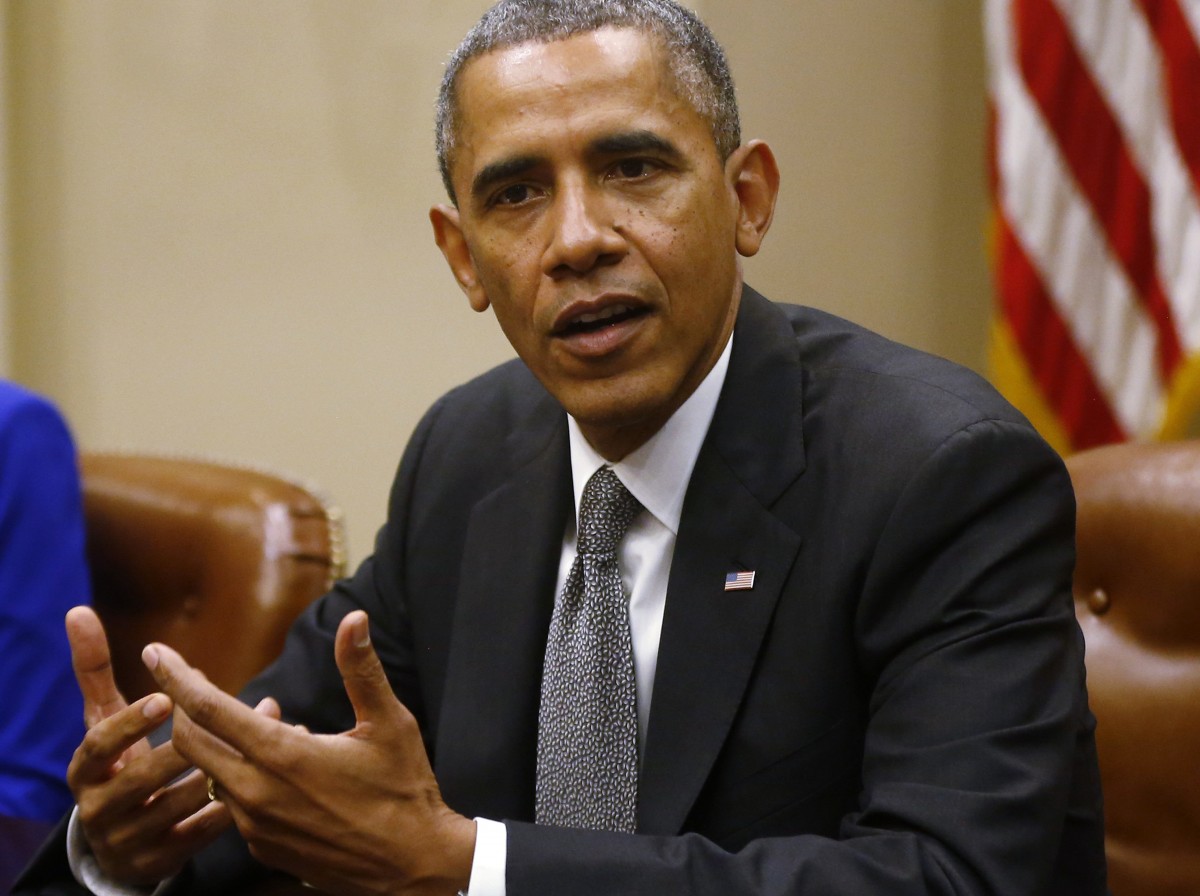
We have heard the GOP talking points regarding why we are in the midst of a government shutdown that has now extended into its second week. Declarations such as Obamacare must be stopped; runaway spending must be reined in; American liberty is at stake flow from the lips of GOP lawmakers like a steady and searching rainfall on pavement – seeking out every crack (and crackpot) receptive to its message.
They have claimed many things regarding what the shutdown is about, but there are a few – a very important few – things that shutdown is not about.
The shutdown is not about the sick
House Republicans introduced a bill to restore funding to the National Institutes of Health only after the Wall Street Journal ran an article highlighting the impact the government shutdown has had on the NIH. The Eric Cantor that was standing at the podium with House Republicans – most dressed in doctor’s jackets – is the same Eric Cantor who in 2009 when he was told of an uninsured woman suffering with cancer, during a town hall meeting, said that there were some hospitals that dealt with charity cases.
It has been made abundantly clear that this shutdown is first and foremost about defunding the Affordable Care Act – a far from perfect solution to this nation’s health care needs, but a solution nonetheless. The conundrum that the Republicans find themselves is that they have no solution; they have no competing narrative other than let’s continue business as usual. Fake outrage about cancer patients being turned away aside, they have a hard time explaining why they reject:
— Insurance plans not being able to deny coverage because of a pre-existing condition. This includes a great number of cancer patients.
— Insurance plans not being able to charge higher premiums for those with health conditions, such as cancer. Historically, people with chronic illnesses or diseases may face higher premiums because of their illness. That added cost can sometimes mean the difference between an affordable policy and one that is just too expensive.
— Insurance plans not being able to drop someone’s coverage just because they are diagnosed with cancer.
No matter what the problems with Obamacare may be, it at least looks like the president was trying to solve a problem – whether you agree or disagree with the solution – and the Republicans look like unreasonable obstructionists. This reality is exacerbated by the shutdown, as they come across as the party who’s not beneath hostage-taking if they don’t get 100 percent of what they want.
The GOP still hasn’t crafted a response to what their alternative is to no more co-pays for recommended preventive cancer screening in new health plans and in Medicare and curbing the $1,265 that it costs, on average, every time someone visits the emergency room – the main means of medical treatment for the uninsured.
The Republicans have failed to answer what they would do to counteract the rising cost of health care premiums; they can’t tell the American public why the avowed pro-life party has a problem with no-cost wellness and pregnancy exams or insurance companies having to spend at least 80 percent of premiums on actual medical costs for the patient.
So the supposed oppression that they purport Obamacare will cause ignores the real tragedy of the 45,000 Americans who die annually because of a lack of healthcare or the calamity of cancer patients who don’t have health insurance being nearly twice as likely to die within five years as those who have it.
The shutdown is not about jobs
This writer cannot imagine any scenario where businesses are more likely to create jobs as a result of a federal government shutdown. The Small Business Administration backs an average of $96 million in small-business lending each day. A great deal of money is used to hire new employees – small businesses have accounted for 55 percent of all jobs and 66 percent of all net new jobs since the 1970s. The crucial work of the SBA is halted as a result of the GOP’s kidnapping of the American economy. The Boston Globe further reports that it isn’t just that the SBA’s hands are tied, but also “at many banks, direct small-business lending is stalled, too, because much of the Internal Revenue Service is closed, preventing lenders from checking applicants’ tax information. Business owners are also grappling with the absence of other crucial services, like E-Verify, the online system companies use to confirm the eligibility of prospective employees to work in the United States.”
It was estimated before the shutdown that 800,000 of 2.1 million federal employees will be furloughed, with no guarantee of retroactive pay. “Essential” employees like active-duty service members, scientists posted to the International Space Station, mine inspectors for the Department of Labor and Secret Service agents will continue to work, many without pay. The members of Congress creating the mess are considered essential, and will receive their paychecks.
So when, essentially, 38 percent of federal employees are told to take an indefinite walk, it isn’t just the immediate impact to that worker that the economy feels, it’s also the cab that worker hails; it’s the restaurant where that worker eats and it’s the garage where that worker parks their car. The pebble of federal workers’ financial insecurity drops into the puddle of all the economic interests connected to their lives spreading the ripples of fiscal uncertainty.
The shutdown is even affecting the release of the monthly jobs report by the U.S. Labor Department – which almost always has an impact on the markets, for good or ill. So what impact will the looming uncertainty about what the jobs report portends have?
Mark Zandi, chief economist of Moody’s Analytics, which collaborates with ADP in releasing the report, said, “The job market appears to have softened in recent months. Fiscal austerity has begun to take a toll on job creation. The run-up in interest rates may also be doing some damage to jobs in the financial services industry.”
For all the incessant chest-thumping in regard to job creation, the shutdown – and the sequestration measures enacted long before it – is doing very little to employ more Americans.
The shutdown is not about the deficit
On the Sunday news program, This Week, House Speaker Boehner admitted that the GOP walked away from a budget deal that was significantly lower than what Senate Democrats wanted. The show’s host, George Stephanopoulos, when interviewing Boehner put it this way: “…Mr. Speaker, he [Senate Majority Leader Harry Reid] says — and he said it publicly on many occasions, that you came to him back in July and offered to pass a clean government funding resolution, no Obamacare amendments, that was $70 billion below what the Senate wanted. They accepted it. And now, you’ve reneged on that offer.”
And what was Boehner’s reply? “I and my members decided the threat of Obamacare and what was happening was so important that it was time for us to take a stand. And we took a stand.”
So a law that was passed by both houses of Congress, signed into law by the President and upheld by the Supreme Court – and not the deficit – is the reason why Republicans felt comfortable in bringing us to the brink of the economic equivalent of a nuclear meltdown.
And if this legislative tirade was really about the deficit, then the Affordable Care Act should be embraced. The CBO stated, in 2010, that Obamacare lowers the deficit by about $124 billion over 10 years. Ironically, the Republicans in 2011 offered a bill to repeal the health care law – the CBO said that would have increased the deficit by about $210 billion over 10 years.
What also damages any GOP argument that the shutdown is about the deficit is that the deficit has already been steadily shrinking. The Treasury Department says the deficit in August was $147.9 billion, down from $191 billion in August 2012. That brings the budget gap to $755 billion for the first 11 months of the budget year, down 35 percent from nearly $1.2 trillion a year earlier.
Mind you, the painful sequestration cuts have played a part in affecting the lowering of deficit – those cuts have also lowered job creation, food security and the educational prospects of our children. It seems that Republicans loathe European-styled socialism, but absolutely love European-styled austerity – and the economic record tells us just how that flawed expedition worked.
Conclusion
One of the GOP’s talking points throughout the shutdown has been that the president will negotiate with Russia, Iran and Syria, but he won’t negotiate with Congressional Republicans. Far be it from this writer to dole out political advice to professional politicians, but the answer to that charge is fairly simple.
Currently, Iran is not holding the full faith and credit of the United States hostage; presently, Russia is not shutting the American government down and creating economic hardship for millions of American citizens; and Syria, for all of its obvious and various faults and problems, is not saying they want to deny health care coverage to about 30 million people in this country. When and if they do, that particular Republican canard might come close to arriving in the neighborhood of plausibility.
There have been some who have suggested this writer must be ignorant of the reality that Democrats and Republicans aren’t all that different at all — that if you are talking about one group you might as well be talking about the other. That hypothesis does carry some weight — and if any of those who decry my supposed ignorance reads the things I’ve written, this writer believes it’s safe to say: I get it.
Nevertheless, the whole ‘pox on both your houses’ argument that’s used to criticize those who point out specific transgressions of a particular group, party or individual, is unsound. Let’s say there’s a referee in a game between Team A and Team B. That referee goes into the game understanding that there is a high likelihood that both teams will commit penalties; that referee goes into the game prepared to call a penalty on whoever commits it. Now does that mean the referee shouldn’t call specific penalties against any team because both teams are more or less inclined to commit them? Absolutely not.
There are times when Team B is holding or engaging in unnecessary roughness and there are times when one political party or figure is more to blame when it comes to a particular issue not being resolved or for an action that shouldn’t have been taken.
And apparently the American people are engaging in bit of refereeing themselves. By a 22-point margin (53 percent to 31 percent), the public blames the Republican Party more for the shutdown than President Obama – a wider margin of blame for the GOP than the party received during the poll during the last shutdown in 1995-96.
No, this shutdown is not about helping the sick, solving our long-term employment problems or deficit reduction – and it’s not about those capricious sentiments that politicians call principles. The hope is that knowing what the shutdown isn’t about can help create the political and public pressure to bring it to an end.


